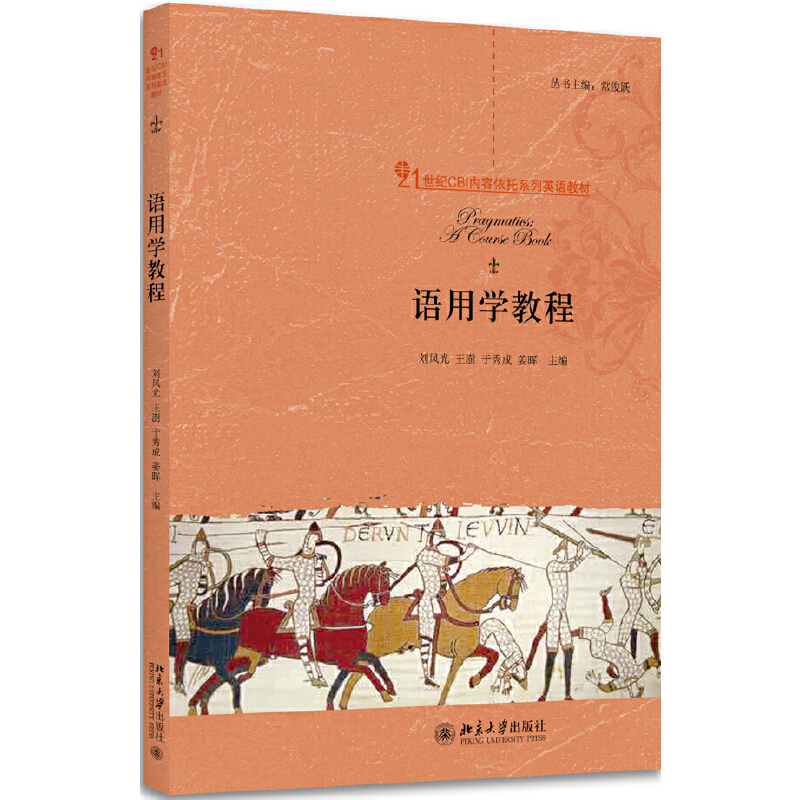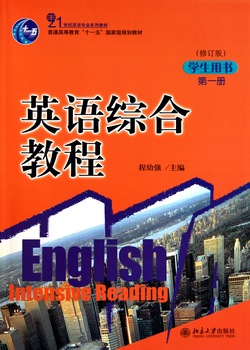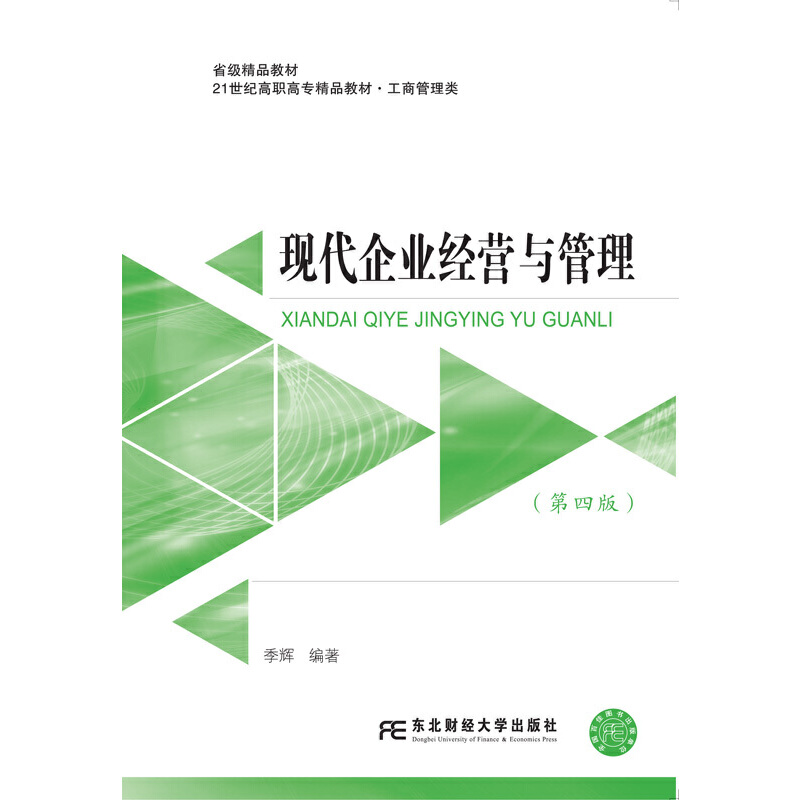语用学教程 / 21世纪CBI内容依托系列英语教材
定价:¥38.00
作者: 刘风光,王澍,于秀成,姜晖
出版时间:2018-06
出版社:北京大学出版社
- 北京大学出版社
- 9787301295182
- 1版
- 229315
- 43190216-2
- 平装
- 2018-06
- 250
- 228
- H319.39
- 英语
作者简介
内容简介
《语用学教程》是普及英语语用学专业知识的教材。本教材开发的指导性理念是CBI(内容依托教学),即依托有意义的专业知识内容提高学生对语言的感悟和英语语言能力。教材开发中融入了任务型教学、研究性教学的理念,旨在调动学生积极参与专业的学习。本教材在保证语用学知识体系完整的前提下,设计多样的语言输入和输出内容,以培养学生对语用学学科知识的掌握和对语言现象进行分析的能力。因此该教材在每一单元都精心设计了旨在对学生在词汇、篇章结构、语言功能等方面进行全面严格训练的基本技能练习。同时设计与语用学相关的、学生参与度较高的课堂和课外活动。这些活动的设置是本教材的亮点之一,它使得课堂教学得以延伸,亦能激发学生的学习热情,是内容与语言融合教学理念在本教材中的体现。
目录
Unit 1 An Overview of Pragmatics ……………………………………………………………………………………1
Text A Defining Pragmatics ……………………………………………………… 3
Text B A Brief History of Pragmatics …………………………………………… 5
Text C From Abstract Meaning to Contextual Meaning …………………………10
Text D Context: A Key Notion in Pragmatics ……………………………………12
Text E Appropriacy ………………………………………………………………13
Unit 2 Deixis ………………………………………………………………………………………………………………… 16
Text A Deixis ……………………………………………………………………18
Text B Social Deixis and Discourse Deixis ……………………………………24
Text C Deictics …………………………………………………………………28
Text D Deictic Centre and Competing Deictic Centres …………………………30
Text E Zonglish …………………………………………………………………32
Unit 3 Speech Acts (I) …………………………………………………………………………………………………… 34
Text A Austin’s Performatives ……………………………………………………36
Text B Utterances as Actions ……………………………………………………38
Text C Austin’s Felicity Conditions on Performatives …………………………44
Text D Speech Acts: Language as Action ………………………………………46
Text E John Langshaw Austin ……………………………………………………48
Unit 4 Speech Acts (II) ………………………………………………………………………………………………… 50
Text A Searle’s Typology of Speech Acts ………………………………………52
Text B Direct and Indirect Speech Acts …………………………………………55
Text C Pragmatics and Indirectness ………………………………………………61
Text D Searle’s Felicity Conditions ………………………………………………63
Text E John Rogers Searle ………………………………………………………65
Unit 5 Implicatures (I) …………………………………………………………………………………………………… 67
Text A Grice’s Cooperative Principle ……………………………………………69
Text B Observing and Flouting the Maxims ……………………………………72
Text C Conventional Implicature and Conversational Implicature ………………80
Text D Properties of Conversational Implicature ………………………………84
语用学教程.indd 1 2018-5-17 13:49:40
2
语用学教程
Pragmatics: A Course Book
Text E Herbert Pul Grice ………………………………………………………87
Unit 6 Implicatures (II) ………………………………………………………………………………………………… 90
Text A Problems with Grice’s Theory ……………………………………………92
Text B Developments of Grice’s Theory ………………………………………94
Text C Relevance Theory …………………………………………………… 100
Text D Post-Gricean Pragmatics ……………………………………………… 103
Text E Stephen C. Levinson ………………………………………………… 107
Unit 7 Conversational Structure ………………………………………………………………………………… 109
Text A What is Conversation? ………………………………………………… 111
Text B Turn-taking and Adjacency Pair ……………………………………… 113
Text C Pre-sequences ………………………………………………………… 118
Text D Preference and Dispreference ………………………………………… 122
Text E The Place of Conversation Among the Speech-exchange Systems … 124
Unit 8 Politeness ………………………………………………………………………………………………………… 126
Text A Brown and Levinson’s Linguistic Politeness Model ………………… 127
Text B Leech’s Politeness Model …………………………………………… 130
Text C Perspectives on Politeness …………………………………………… 135
Text D Towards an Anatomy of Impoliteness ………………………………… 142
Text E Geoffrey Neil Leech …………………………………………………… 152
Unit 9 Macropragmatics …………………………………………………………………………………………… 157
Text A Variability, Negotiability and Adaptability …………………………… 158
Text B Pragmatic Acts and Action Theory …………………………………… 163
Text C Intercultural Pragmatics ……………………………………………… 170
Text D Variational Pragmatics ………………………………………………… 178
Text E Some Thoughts on Pragmatics, Sociolinguistic Variation, and
Intercultural Communication ………………………………………… 185
Unit 10 Pragmatics and Its Interfaces ………………………………………………… 194
Text A The Semantics/Pragmatics Distinction ……………………………… 196
Text B Pragmatics and Grammar …………………………………………… 198
Text C Pragmatics and Prosody ……………………………………………… 206
Text D Literary Pragmatics: An Overview …………………………………… 209
Text E Anticipatory Pragmatics ……………………………………………… 212
语
Text A Defining Pragmatics ……………………………………………………… 3
Text B A Brief History of Pragmatics …………………………………………… 5
Text C From Abstract Meaning to Contextual Meaning …………………………10
Text D Context: A Key Notion in Pragmatics ……………………………………12
Text E Appropriacy ………………………………………………………………13
Unit 2 Deixis ………………………………………………………………………………………………………………… 16
Text A Deixis ……………………………………………………………………18
Text B Social Deixis and Discourse Deixis ……………………………………24
Text C Deictics …………………………………………………………………28
Text D Deictic Centre and Competing Deictic Centres …………………………30
Text E Zonglish …………………………………………………………………32
Unit 3 Speech Acts (I) …………………………………………………………………………………………………… 34
Text A Austin’s Performatives ……………………………………………………36
Text B Utterances as Actions ……………………………………………………38
Text C Austin’s Felicity Conditions on Performatives …………………………44
Text D Speech Acts: Language as Action ………………………………………46
Text E John Langshaw Austin ……………………………………………………48
Unit 4 Speech Acts (II) ………………………………………………………………………………………………… 50
Text A Searle’s Typology of Speech Acts ………………………………………52
Text B Direct and Indirect Speech Acts …………………………………………55
Text C Pragmatics and Indirectness ………………………………………………61
Text D Searle’s Felicity Conditions ………………………………………………63
Text E John Rogers Searle ………………………………………………………65
Unit 5 Implicatures (I) …………………………………………………………………………………………………… 67
Text A Grice’s Cooperative Principle ……………………………………………69
Text B Observing and Flouting the Maxims ……………………………………72
Text C Conventional Implicature and Conversational Implicature ………………80
Text D Properties of Conversational Implicature ………………………………84
语用学教程.indd 1 2018-5-17 13:49:40
2
语用学教程
Pragmatics: A Course Book
Text E Herbert Pul Grice ………………………………………………………87
Unit 6 Implicatures (II) ………………………………………………………………………………………………… 90
Text A Problems with Grice’s Theory ……………………………………………92
Text B Developments of Grice’s Theory ………………………………………94
Text C Relevance Theory …………………………………………………… 100
Text D Post-Gricean Pragmatics ……………………………………………… 103
Text E Stephen C. Levinson ………………………………………………… 107
Unit 7 Conversational Structure ………………………………………………………………………………… 109
Text A What is Conversation? ………………………………………………… 111
Text B Turn-taking and Adjacency Pair ……………………………………… 113
Text C Pre-sequences ………………………………………………………… 118
Text D Preference and Dispreference ………………………………………… 122
Text E The Place of Conversation Among the Speech-exchange Systems … 124
Unit 8 Politeness ………………………………………………………………………………………………………… 126
Text A Brown and Levinson’s Linguistic Politeness Model ………………… 127
Text B Leech’s Politeness Model …………………………………………… 130
Text C Perspectives on Politeness …………………………………………… 135
Text D Towards an Anatomy of Impoliteness ………………………………… 142
Text E Geoffrey Neil Leech …………………………………………………… 152
Unit 9 Macropragmatics …………………………………………………………………………………………… 157
Text A Variability, Negotiability and Adaptability …………………………… 158
Text B Pragmatic Acts and Action Theory …………………………………… 163
Text C Intercultural Pragmatics ……………………………………………… 170
Text D Variational Pragmatics ………………………………………………… 178
Text E Some Thoughts on Pragmatics, Sociolinguistic Variation, and
Intercultural Communication ………………………………………… 185
Unit 10 Pragmatics and Its Interfaces ………………………………………………… 194
Text A The Semantics/Pragmatics Distinction ……………………………… 196
Text B Pragmatics and Grammar …………………………………………… 198
Text C Pragmatics and Prosody ……………………………………………… 206
Text D Literary Pragmatics: An Overview …………………………………… 209
Text E Anticipatory Pragmatics ……………………………………………… 212
语











